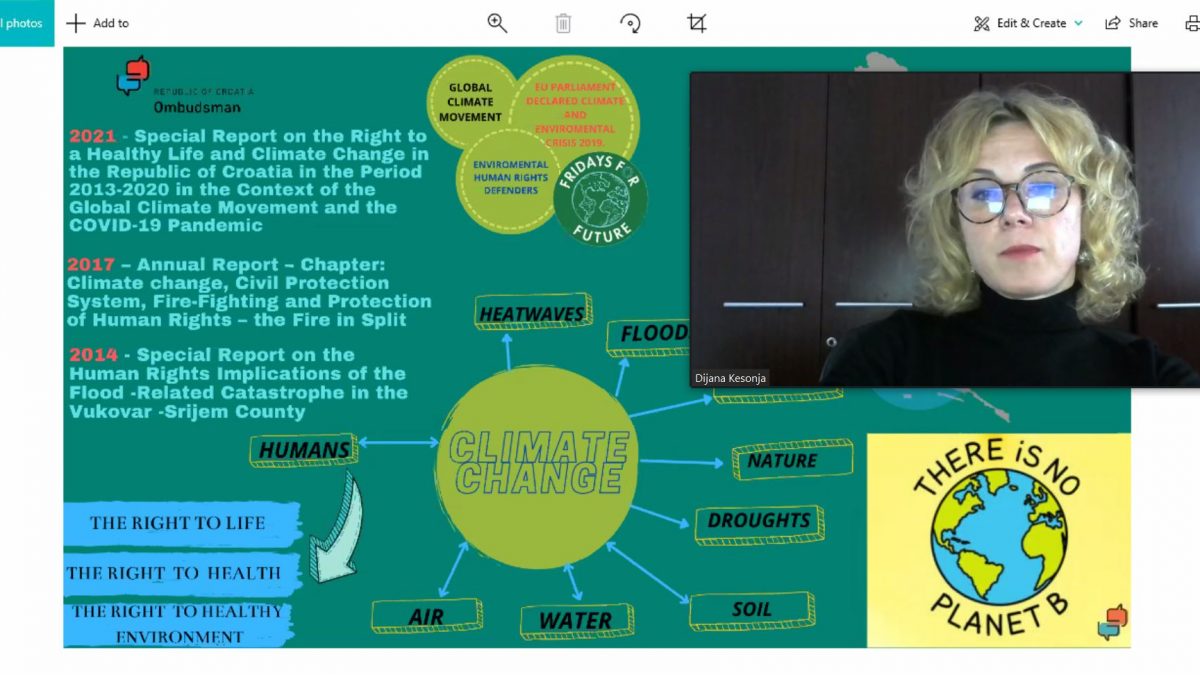A disaster can hit at any time. Thus, an adequate normative framework is crucial to enable a quick recovery and protect the rights of every citizen, i.e. to prevent, as much as possible, their violations.
The Global Alliance of National Human Rights Institutions (GANHRI) and the Stirling University in collaboration with the European Network of National Human Rights Institutions (ENNHRI), the Scottish Human Rights Commission (SHRC), the UN Environmental Program (UNEP), the UN Development Program (UNDP) and the Office of the UN High Commissioner on Human Rights (OHCHR) hosted a symposium on the role of National Human Rights Institutions (NHRIs) in the context of climate change and its impact on human rights, with a primary focus on the protection of human rights of those already suffering the consequences of climate change as well as the participation of these institutions in the development of the measures and strategies designed to mitigate them. The event took place on 3 – 5 November 2021 in Glasgow, Scotland.
The Office of the Ombudswoman of the Republic of Croatia was represented by Deputy Ombudswoman Dijana Kesonja, who gave an overview of the work of our institution at the intersection of climate change and human rights, using the example of two events: the floods that hit the eastern parts of the country in 2014 and the fire that swept through the coastal city of Split in 2017.
“Following the disastrous floods that hit Eastern Croatia in 2014, we submitted a special report to the Croatian Parliament containing numerous recommendations pertaining to protection and rescue, social welfare, health care, humanitarian aid, rehabilitation and reconstruction, information provision and free legal aid, with the aim of fostering the development of those systems to be able to better respond to the potential future crises. The Report was based on our monitoring of the impact of the floods on the affected population and on the information collected through complaints submitted to the Office, field visits, interviews with numerous stakeholders and affected citizens, as well as other available data, analysis of the regulations and of the news coverage. Although it referred to a specific situation and its consequences, its recommendations were intended and are applicable for all other future emergency situations with the potential to affect the level of the exercise of human rights, such as the right to life and to health, property rights as well as those related to the protection of nature and the environment. Their necessity was, unfortunately, demonstrated in 2020, when catastrophic earthquakes hit Croatia’s capital, Zagreb, and its Sisak-Moslavina County. Disasters can hit at any time; there is no way of predicting them. Thus, it is important to have an adequate normative framework to limit their consequences, enable a fast recovery and to protect all of the citizens’ rights, i.e. to prevent, as much as possible, their violations,“ stressed Deputy Ombudswoman Kesonja.
Discussing the 2017 Split fire, Deputy Ombudswoman Kesonja detailed our institution’s actions following the event aimed at warning the public about its impacts on the human rights of the affected population, the weaknesses in the organization of thecivil protection system and the firefighting service as well as about the inadequate provision of information to the public and the deficiencies in the hydrant networks. In addition to this, our institution organized a round table discussion in the Croatian Parliament with the aim of discussing potential solutions to improve the crisis response system so that it would be able to respond more efficiently in similar future situations.
Both of the above mentioned case studies are featured in the Ombudswoman’s most recent special report to the Parliament on the right to a healthy life and climate change in the Republic of Croatia in the period 2013-2020, available here.
„The described cases make clear the interconnections between climate change and human rights: the right to life, health, to a clean, healthy and sustainable environment, to access to information, free legal aid and others but also the connection with the organization of the civil protection system, the firefighting service, physical planning, construction, etc. In line with our mandates, we continue monitoring all of these areas and reporting to the Croatian Parliament on the impact of various events, including those caused by climate change, on human rights,” Deputy Ombudswoman Kesonja said.
The event was held on the sidelines of the 26th UN Climate Conference (COP26) taking place in Glasgow from 31 October to 12 November 2021.


